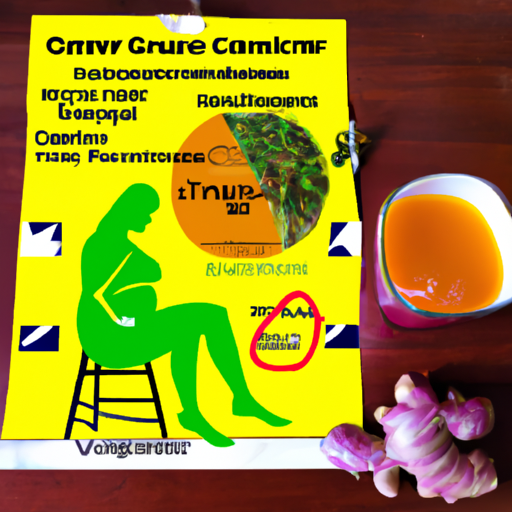As an individual always seeking natural remedies to enhance my health, I was thrilled to discover the potential advantages of turmeric and ginger. These two spices have a long history in traditional medicine and have become increasingly popular for their anti-inflammatory and antioxidant qualities.
However, as I delved deeper into the research, I discovered that there are certain groups of people who should avoid consuming turmeric and ginger. While turmeric and ginger are generally safe for most people, individuals taking certain medications should be cautious. These spices can interact with blood thinners, such as warfarin, and increase the risk of bleeding. Additionally, turmeric and ginger can interact with medications for diabetes and high blood pressure, potentially affecting their effectiveness. It is important to speak with a healthcare provider before adding turmeric and ginger to your diet if you are taking any medications.
In addition, individuals with gallbladder or kidney issues should also avoid consuming large amounts of turmeric and ginger. These spices can increase the production of bile and increase the risk of gallstones. In people with kidney issues, high doses of turmeric and ginger can cause kidney damage. As with any dietary supplement, it is important to consider your individual health needs before adding turmeric and ginger to your diet.
Key Takeaways
- Certain groups of people, such as those with gallbladder or kidney issues, should avoid consuming large amounts of turmeric and ginger.
- Individuals taking certain medications, such as blood thinners or medications for diabetes and high blood pressure, should be cautious when consuming turmeric and ginger.
- Pregnant or breastfeeding women should avoid consuming turmeric and ginger.
- People with allergies or gastrointestinal issues should be cautious when consuming turmeric and ginger.
People Taking Certain Medications
If you’re taking certain medications, such as blood thinners or diabetes medications, you shouldn’t take turmeric and ginger without consulting with your doctor first. This is because these herbs can interact with certain medications, potentially causing adverse effects.
For instance, turmeric and ginger can increase the risk of bleeding in people taking blood thinners, and may also lower blood sugar levels in people taking diabetes medications. Thus, it’s important to talk to your doctor before taking these herbs, especially if you’re on any kind of medication.
When it comes to turmeric and ginger, dosage recommendations are also important to consider. Consuming these herbs in high amounts can cause gastrointestinal issues such as nausea, diarrhea, and stomach upset. Therefore, it’s important to follow dosage recommendations and not exceed the recommended amount.
In addition, if you’re taking medication, it’s important to talk to your doctor about how much of these herbs you can safely consume. With that being said, individuals with gallbladder or kidney issues should also be cautious when taking turmeric and ginger.
Individuals with Gallbladder or Kidney Issues
I’ve personally experienced the pain and discomfort associated with gallstones and kidney stones. Therefore, it’s important to note that individuals with gallbladder or kidney issues should exercise caution when consuming turmeric and ginger.
These spices are known to have potential interactions with certain medications and can worsen symptoms in those with existing conditions.
Gallstones
You shouldn’t take turmeric and ginger if you have gallstones, as they may exacerbate the condition and cause discomfort. Gallstones are hardened deposits of digestive fluid that form in your gallbladder, and they can cause severe pain, inflammation, and other complications. If you have gallstones, it’s important to follow your doctor’s advice for treatment and prevention, which may include dietary changes, medication, or surgery.
To avoid aggravating your gallstones, it’s best to avoid foods and supplements that may stimulate the gallbladder, such as turmeric and ginger. Here are three reasons why:
-
Turmeric and ginger contain compounds that may increase bile production, which can lead to more frequent and painful gallbladder contractions.
-
These herbs may also cause inflammation and irritation in the gallbladder and surrounding tissues, making your symptoms worse.
-
In rare cases, turmeric and ginger supplements may even cause gallbladder rupture or other serious complications, especially if you have a history of gallbladder disease.
Now, let’s move on to the next subtopic: kidney stones.
Kidney stones
Suffering from kidney stones can be a painful and uncomfortable experience, and it’s important to be mindful of what we eat and drink to prevent further complications. While turmeric and ginger have been known for their anti-inflammatory properties, individuals with kidney stones should be cautious when consuming these supplements. This is because both turmeric and ginger contain high levels of oxalate, which can contribute to the formation of kidney stones.
Prevention tips for kidney stones include staying hydrated, reducing salt intake, and avoiding foods high in oxalate such as spinach, beets, and chocolate.
Common symptoms of kidney stones include severe pain in the back, side, and lower abdomen, nausea, vomiting, and blood in the urine. It’s important to seek medical attention if these symptoms persist, as kidney stones can lead to more serious health problems if left untreated.
Moving into the next section about pregnant or breastfeeding women, it’s important to note that certain foods and supplements should also be avoided during this time.
Pregnant or Breastfeeding Women
Expecting or nursing mothers shouldn’t take turmeric and ginger, as these herbs may pose risks to the baby’s health. While turmeric and ginger offer numerous health benefits, including anti-inflammatory and antioxidant properties, pregnant and breastfeeding women should avoid consuming them. There is limited research on the safety of these herbs during pregnancy and breastfeeding, and their potential effects on the developing fetus or nursing baby are not well understood.
In the meantime, there are alternative recipes for pregnant and breastfeeding women to use as natural remedies for morning sickness and other pregnancy-related discomforts. These may include ginger tea made from fresh ginger root, lemon and honey, or a turmeric latte made with almond milk and honey. It’s important to consult with your healthcare provider before incorporating any new herbal remedies into your diet during pregnancy or while breastfeeding.
Individuals with allergies should also be cautious when consuming turmeric and ginger.
Individuals with Allergies
Individuals with allergies need to be cautious when consuming these herbs. While turmeric and ginger are generally safe and beneficial, they can cause adverse reactions in some people with allergies.
Food allergies, in particular, can be triggered by these herbs and may result in symptoms such as hives, swelling, and difficulty breathing. Environmental allergies, such as hay fever, may also be aggravated by these herbs and cause symptoms such as sneezing, runny nose, and itchy eyes.
It is important to note that not everyone with allergies will react to turmeric and ginger. However, if you have a known allergy to these herbs or any of their components, you should avoid consuming them altogether. If you’re unsure whether you have an allergy to turmeric or ginger, consult with your healthcare provider before consuming them.
In the next section, we will discuss how people with gastrointestinal issues may need to take extra precautions when consuming turmeric and ginger.
People with Gastrointestinal Issues
As someone who’s personally experienced gastrointestinal issues, I understand the importance of being cautious about what I consume. While turmeric and ginger have numerous health benefits, they may not be suitable for everyone, especially those with gastrointestinal issues.
These conditions can include acid reflux, ulcers, and irritable bowel syndrome (IBS). Consuming turmeric and ginger in high doses or on an empty stomach can irritate the lining of the stomach and exacerbate symptoms of these conditions. However, this doesn’t mean that those with gastrointestinal issues can’t enjoy the benefits of these two spices.
There are turmeric and ginger alternatives, such as supplements or capsules, that are easier on the stomach. It’s also important to prepare turmeric and ginger in a way that maximizes absorption, such as combining them with black pepper or healthy fats.
By being mindful of how we consume these spices, we can still reap their benefits without causing harm to our digestive system.
Frequently Asked Questions
Are there any specific medications that interact negatively with turmeric and ginger?
Although turmeric and ginger are generally safe, potential medication interactions exist. Individuals with liver conditions should also exercise caution. It’s important to speak with your healthcare provider before taking these supplements to ensure they are safe for you.
Can turmeric and ginger supplements be harmful to individuals with gallbladder or kidney stones?
As someone with gallbladder or kidney stones, I should consult with my doctor before taking turmeric and ginger supplements. While they have potential health benefits, supplement safety must be considered for those with these conditions.
Is it safe for pregnant women to consume turmeric and ginger in small amounts?
As a pregnant woman, it is safe to consume turmeric and ginger in small amounts. These spices have been shown to provide benefits for the baby and can be used as alternative remedies. However, pregnancy concerns should always be discussed with a healthcare provider.
What are some common allergic reactions to turmeric and ginger, and how severe can they be?
Allergic reactions to turmeric and ginger can range from mild to severe, including hives, swelling, and difficulty breathing. Some medications may negatively interact with these spices. Allergy testing and alternative spices may be necessary for those with allergies.
How can individuals with gastrointestinal issues consume turmeric and ginger without exacerbating their symptoms?
To consume turmeric and ginger while avoiding gastrointestinal issues, I consult with a healthcare professional and use alternative consumption methods like capsules or teas. It’s essential to start with small doses and monitor any adverse reactions.
Conclusion
In conclusion, while turmeric and ginger offer a plethora of health benefits, they may not be suitable for everyone. If you’re taking certain medications, such as blood thinners or diabetes medications, it’s important to consult with your healthcare provider before incorporating these spices into your diet.
Similarly, individuals with gallbladder or kidney issues should exercise caution, as excessive consumption may exacerbate these conditions. Pregnant or breastfeeding women should also be mindful of their intake, as there is limited research on the safety of these spices during these periods.
Lastly, those with allergies or gastrointestinal issues should avoid turmeric and ginger or consume them in moderation. In summary, while turmeric and ginger are widely regarded as beneficial, it’s important to consider individual circumstances before incorporating them into your diet.










